Whether you’re relocating across the country, buying a car sight-unseen, or need hassle-free transportation for your prized classic, open vehicle transport offers a convenient and cost-effective solution (and a service Movewheels is proud to offer!)
But navigating the intricacies of this service can be confusing, especially with fluctuating rates and different companies vying for your business. This comprehensive guide sheds light on open vehicle transport, answering your questions and empowering you to make informed decisions.
How Open Auto Transport Works: A Journey from Point A to Point B
Imagine your vehicle securely strapped onto a multi-level trailer, sharing the ride with several others. That’s essentially the essence of open auto transport. Specialized carriers with open-air decks efficiently transport multiple vehicles simultaneously, reducing costs and offering nationwide coverage.
Here’s how it works:
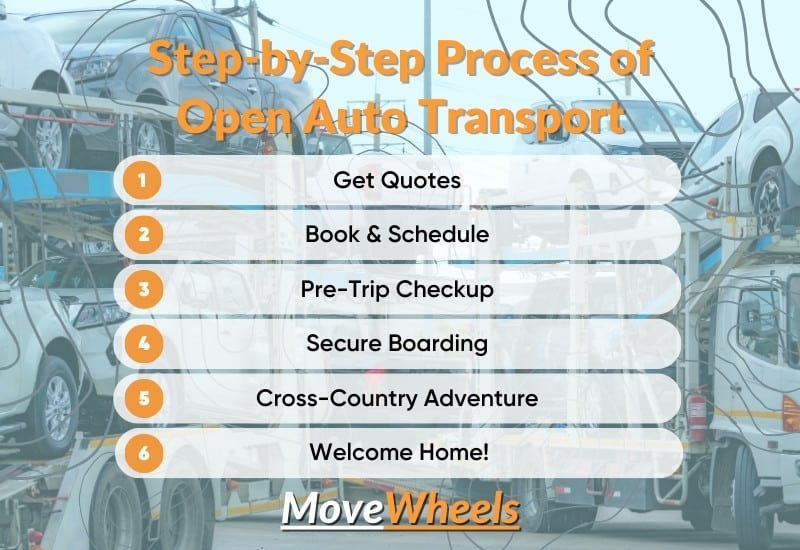
Open transport is a convenient and efficient way to move your car, but it’s not a one-size-fits-all solution. Stay tuned for the next part of our journey, where we’ll explore the different types of trailers, weigh the pros and cons of open transport, and unveil the factors that affect the cost of shipping your car coast-to-coast with Movewheels!
Unveiling the Fleet: Exploring Different Trailer Types
Now that we’ve demystified the open transport process, let’s delve into the different types of trailers you’ll encounter:
Think of these trailers as the various “ships” in your car’s open-water voyage:
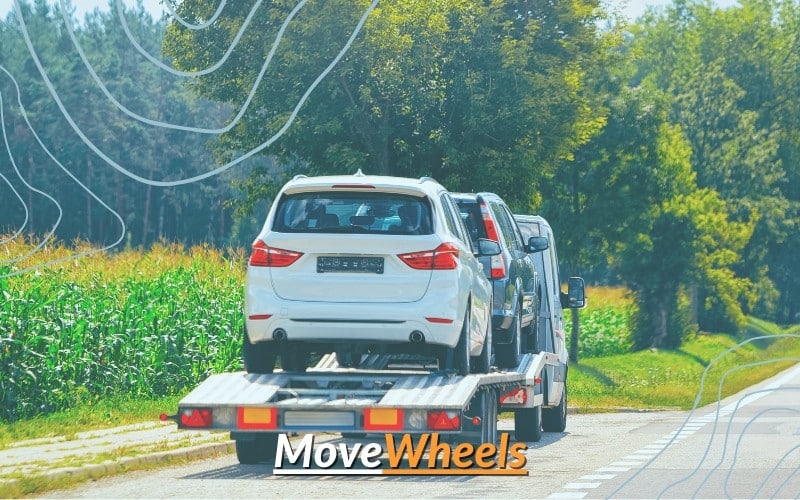
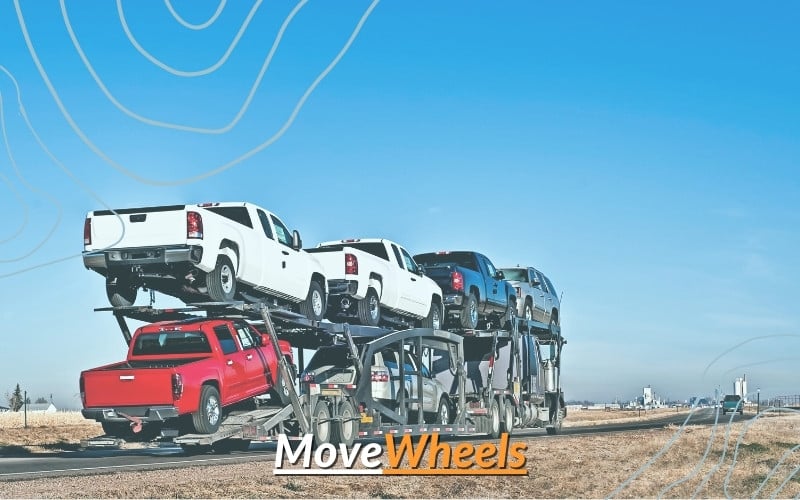
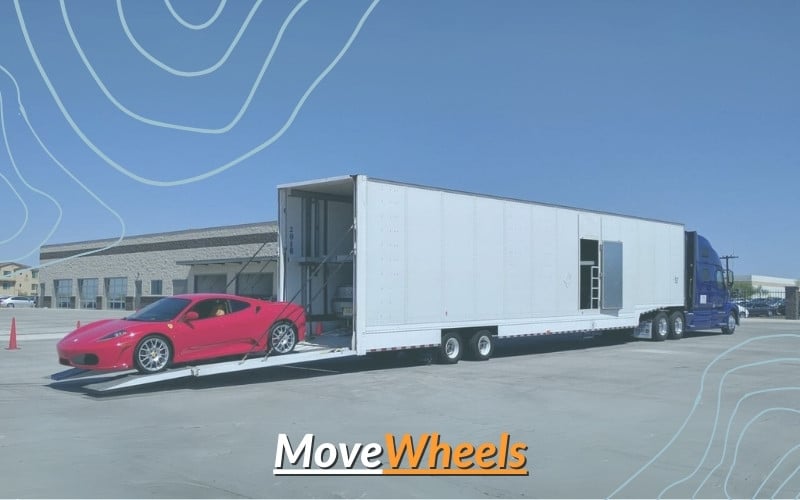
Choosing the right trailer depends on several factors:
Remember: Transport companies like Movewheels can help you choose the right trailer based on your specific needs and budget. Don’t hesitate to reach out to their friendly experts for personalized advice!
Weighing the Scales: Pros and Cons of Open Transport
Now that you’ve got the lowdown on trailer types in the world of open transport, let’s dive into the crucial question: is it the right choice for you?
Like any good road trip, there are scenic overlooks and bumpy patches to consider. Buckle up as we explore the pros and cons of open transport:
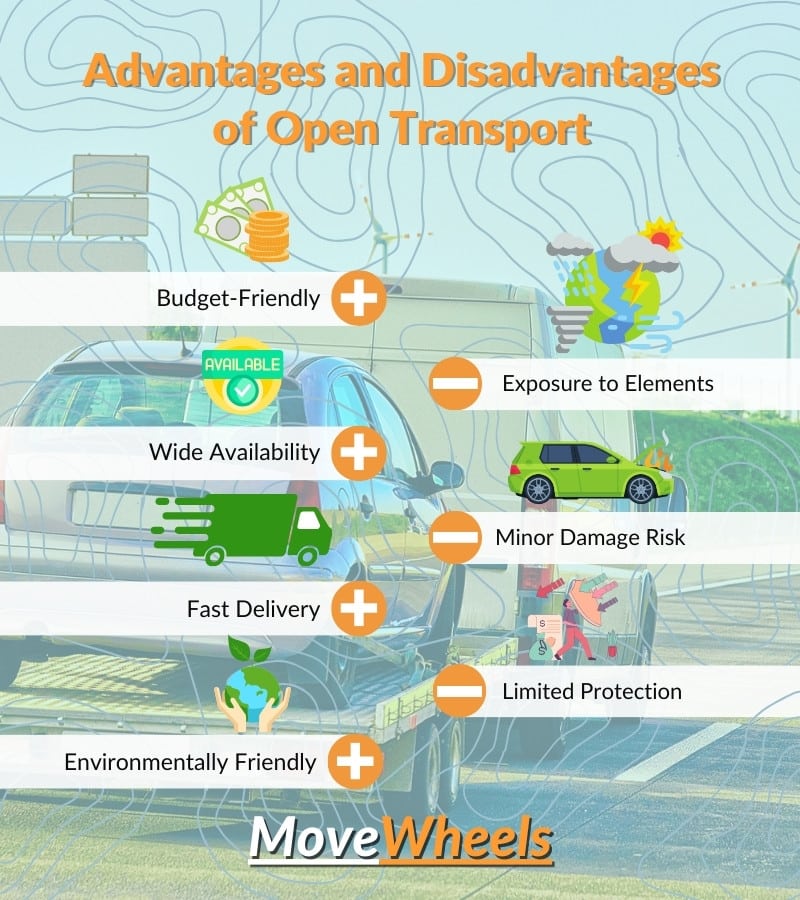
Pros:
Cons:
The decision ultimately depends on your priorities and your car’s needs. If you’re on a tight budget and willing to accept some minor exposure risk, open transport could be a great option. However, for high-value vehicles or those requiring maximum protection, our top enclosed companies are the way to go.
Still unsure? Don’t worry, Movewheels is here to help! Our friendly experts can assess your specific needs and recommend the best trailer type for your car. Contact us today for a personalized quote and a smooth, stress-free open transport experience!
Open Car Transport Rates: Understanding Costs and Affecting Factors
So, you’re ready to embark on the open transport adventure with your trusty car. But before you hit the “book now” button, let’s talk about the most important factor: cost. Buckle up, because we’re about to demystify the factors that affect your car’s cross-country price tag.
Remember: Open transport is generally the most affordable car shipping option, but the exact cost depends on several key factors:
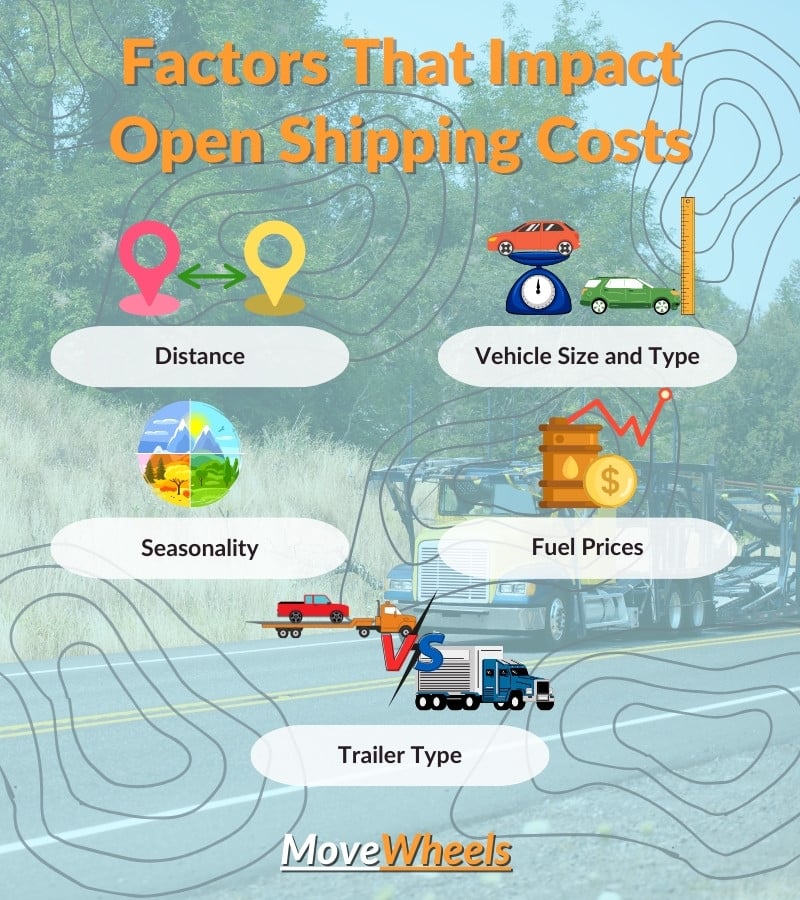
Here’s a quick tip: To get a more accurate idea of your specific costs, get quotes from Movewheels. We can provide personalized estimates based on your unique needs and current market condition.
Remember: Don’t be afraid to negotiate! Open transport companies often offer flexible pricing, so don’t be shy to ask for a better deal, especially if you’re flexible with dates or pick-up/drop-off locations.
Still wondering about specific costs?
Route | Distance (miles) | Estimated Price Range |
Los Angeles, CA to New York, NY | 2,795 | $700 - $1,200 |
Chicago, IL to Miami, FL | 1,350 | $550 - $900 |
Seattle, WA to Denver, CO | 1,200 | $400 - $750 |
Houston, TX to Boston, MA | 2,100 | $650 - $1,050 |
Keep in mind: these are just estimates, and the actual cost could be higher or lower depending on the factors mentioned above.
Ready to get a personalized quote and embark on your open transport adventure? Movewheels is here to help! Contact us today for expert advice, transparent pricing, and a smooth, stress-free experience. Remember, we’re your one-stop shop for all your vehicle transport needs!
How to Compare Open Auto Transport Quotes?
Don’t just settle for the first quote! Take these steps to ensure you’re getting the best Now that you’ve grasped the pros, cons, and costs of open vehicle transport (a.k.a. open car shipping, open transport, or using open car carriers), it’s time to tackle the crucial step: comparing quotes. Fear not, fellow road warriors! With a little know-how, you can navigate the quote maze and land the perfect deal for your car’s journey.
Here’s your guide to comparing open transport quotes like a pro:
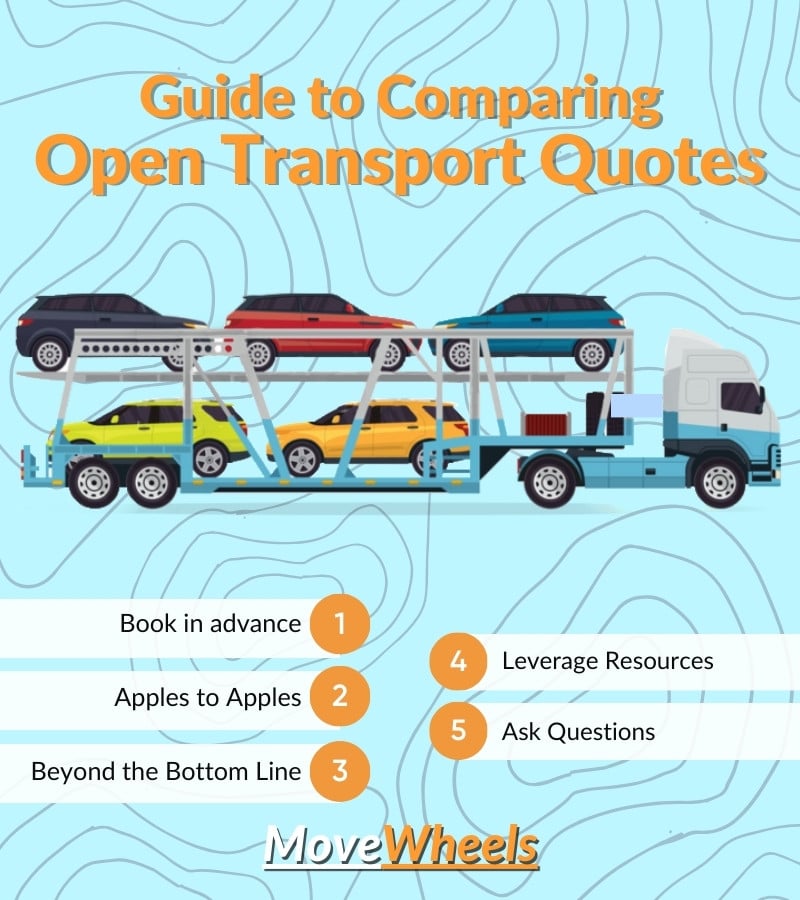
Remember, Movewheels is always here to help! We offer transparent pricing, a user-friendly platform for comparing quotes, and a dedicated team of experts to answer your questions and guide you through the process.
What Documents Are Required for Open Auto Transport?
Congratulations! You’ve compared quotes, chosen your champion open transport company (like the amazing Movewheels, of course!), and booked your car’s cross-country adventure.
But before your vehicle hits the road, there’s one more hurdle to navigate: paperwork.
Don’t worry, it’s not an Everest-sized mountain, more like a friendly speed bump.
Let’s break down the essential documents you’ll need for a smooth open transport (a.k.a. open car shipping, open car carrier) experience:
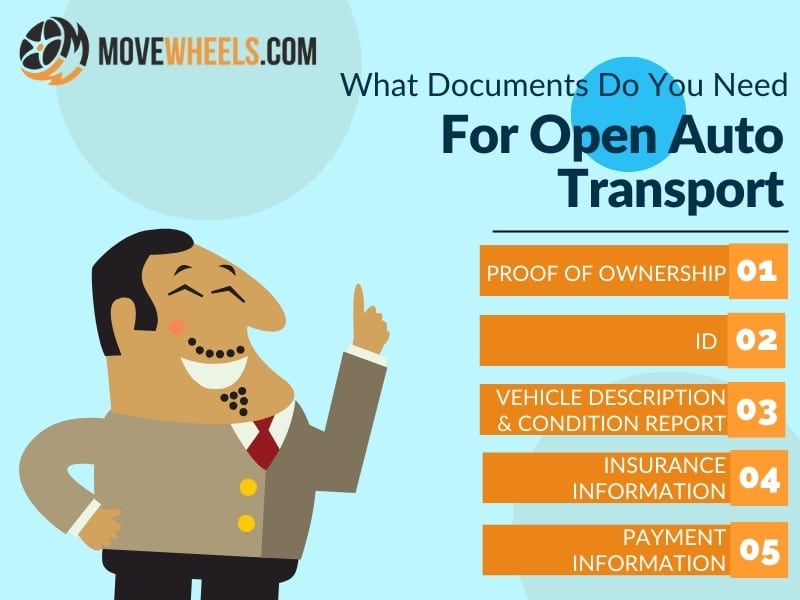
1. Proof of Ownership: This is the key that unlocks the car carrier! Depending on your situation, you might need:
2. Government-Issued ID: Show the carrier you’re the authorized representative with a valid driver’s license or passport.
3. Vehicle Description and Condition Report: This detailed document, often provided by the transport company, outlines your car’s make, model, year, VIN, mileage, and any pre-existing damage. Both you and the driver will sign it, ensuring everyone’s on the same page. Think of it as a snapshot of your car before its journey.
4. Insurance Information: While the transport company typically carries insurance, having your own comprehensive coverage provides additional peace of mind. Provide your policy details for extra security.
5. Payment Information: Settle the transport fees using your preferred method, whether credit card, debit card, or certified check. Remember, transparent companies like Movewheels will clearly outline all costs upfront.
Bonus Tip: Keep copies of all documents for your records! It’s like packing an extra travel adapter – better safe than sorry.
Now that you’re armed with the right documents and the expertise of Movewheels, your car’s open transport journey is ready to roll! Buckle up for a smooth and stress-free experience!
So, there you have it! Your guide to open vehicle transport (a.k.a. open car shipping, open car carriers) in 2024. Now you know the ins and outs, from trailer types to paperwork prep. Remember, the key is to choose a reputable company like Movewheels, compare quotes, and ask questions. With a little planning and the right partner, your car can embark on its cross-country adventure with ease.
Ready to hit the open road (well, your car will)!
Contact Movewheels today for a free quote and expert advice. We’ll handle the logistics, leaving you free to focus on the exciting new chapter awaiting your vehicle at its destination.
Remember, Movewheels is your one-stop shop for all your open transport needs. Let’s get your car rolling!
FAQ
Is open transport safe for my car?
Open transport is generally safe, but there’s a slight risk of minor cosmetic damage from weather or road debris. Opt for enclosed trailers for high-value or classic cars.
What happens if my car gets damaged during transport?
Reputable companies carry insurance, but having your own comprehensive coverage provides additional protection. Always document any pre-existing damage before transport.
Can I ship personal belongings with my car?
Generally, no. Most companies prohibit personal belongings for safety and insurance reasons. Consider shipping them separately.
How long does open transport take?
Delivery times vary depending on distance, route, and weather conditions. Movewheels provides estimated timelines for your specific journey.
What is the difference between a broker and a carrier?
Brokers connect you with carriers, while carriers handle the actual transport.
What if I need to cancel my transport?
Most companies have cancellation policies with fees based on the notice period. Movewheels offers flexible options and clear communication throughout the process.
Similiar Articles
- Is Your RV Ready for Spring Travel? Pre-Transport Checklist
- Open Vehicle Transport: How it Works and How Much It Costs in 2024
- Secure and Sophisticated: Your Complete Guide to Enclosed Auto Transport with MoveWheels
- New Year, New Motorcycle: Top Motorcycles` Choice among Americans in 2024
- How Vehicle Type Impacts Transportation Costs: From Cars to Heavy Equipment
- Why You Shouldn’t Put Personal Items in Your Car During Shipping
- Top 5 Advices for Shipping a Classic Car
- Choosing the Right Trailer for Heavy Equipment Transport
- The Mom’s Guide to Buying a Car
- Smooth Sailing: A Comprehensive Guide to Boat Transportation
